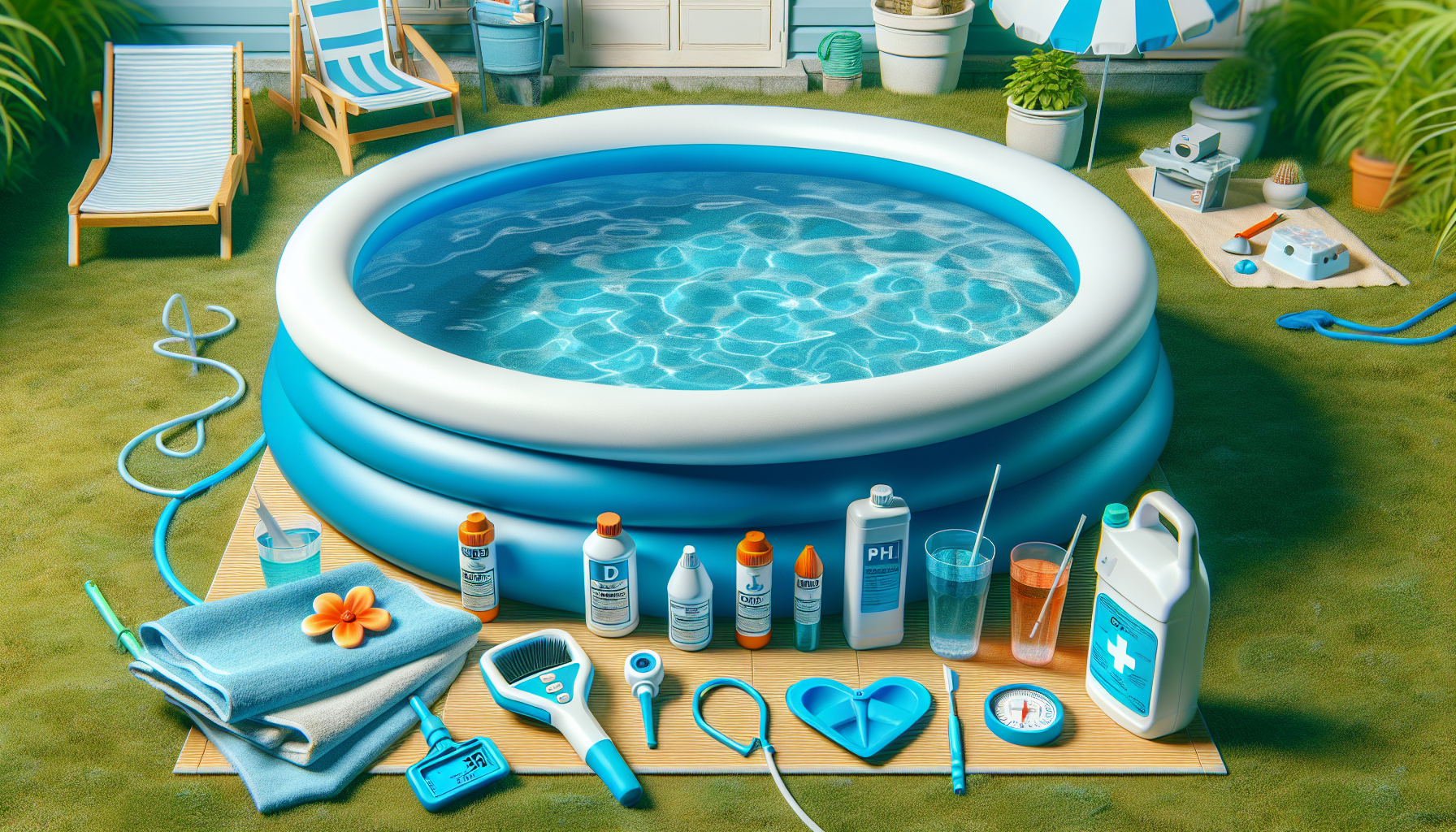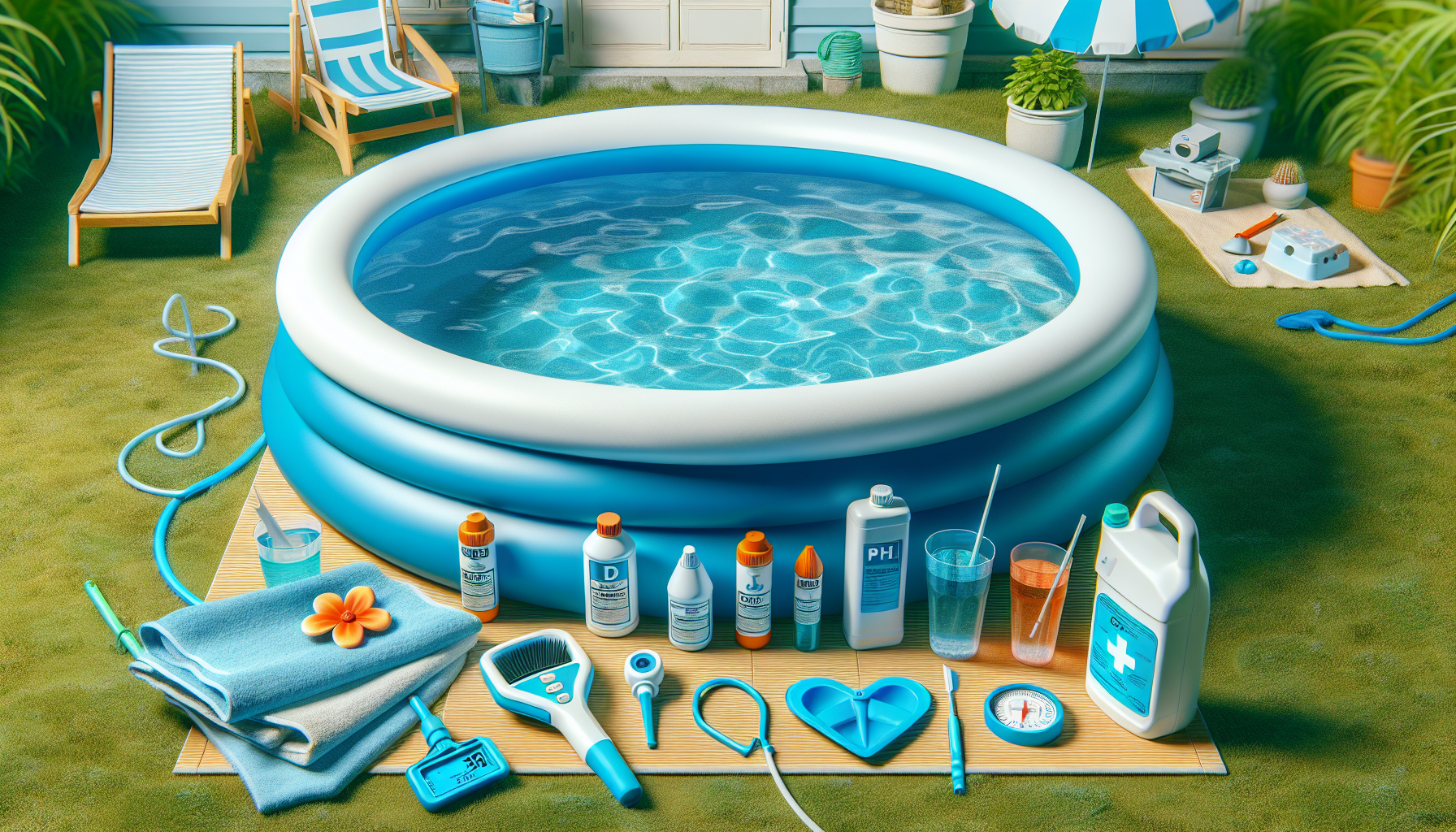Maintaining a clean and clear inflatable pool may seem like a daunting task, but with a few simple steps, you can ensure that your pool water remains pristine all summer long. By regularly testing and balancing the water chemistry, using a pool cover when the pool is not in use, and implementing a regular cleaning routine, you can create a refreshing oasis in the comfort of your own backyard. Say goodbye to murky and cloudy water, and hello to crystal-clear summer fun!

Choosing the Right Location
When setting up your inflatable pool, it is important to consider the location carefully. Look for a spot that receives favorable conditions for the pool. Ideally, you’ll want an area that receives ample sunlight throughout the day, as this helps to maintain the pool water temperature. Additionally, choose a location that is relatively flat and stable to ensure the pool remains level and secure.
Avoid placing the pool in shaded areas, as this can lead to colder water temperatures and slower water evaporation. The lack of sunlight can also promote the growth of algae, which can be a hassle to deal with. By selecting a sunny spot, you’ll not only create a comfortable swimming environment but also reduce the risk of algae growth.
Keep the pool away from trees and plants to minimize the accumulation of leaves, branches, and other debris. Falling leaves and twigs can contaminate the water and clog the pool’s filtration system. By choosing a location that is clear of trees and plants, you’ll save yourself the trouble of constantly removing debris and maintaining the pool’s cleanliness.
Preparing the Inflatable Pool
Before filling your inflatable pool, it is crucial to thoroughly clean it. Clean the interior using a mild detergent or soap and water, ensuring you remove any dirt, dust, or residue. Rinse the pool thoroughly to remove any cleaning agents and ensure that the water you fill it with is clean.
Inspect the pool for any damages or leaks before setting it up. Look for any punctures, tears, or weak spots in the material. If you notice any damage, follow the manufacturer’s instructions for patching or repairing the pool. Addressing any issues beforehand will prevent water from leaking out and prolong the lifespan of your inflatable pool.
Ensure proper inflation of the pool to maintain its stability and structural integrity. Check the inflation valves and make sure they are secured tightly. Overinflating or underinflating the pool can affect its performance and durability. Follow the manufacturer’s recommendations for the appropriate air pressure to ensure a safe and enjoyable swimming experience.
Using a Pool Cover
When your inflatable pool is not in use, it is essential to cover it properly. Using a pool cover helps to prevent debris and leaves from falling into the water, keeping it clean and reducing the need for frequent cleaning. Additionally, it helps to retain heat and reduce evaporation, which can save you on water and energy costs.
Choose a cover that fits the pool properly to ensure maximum effectiveness. A well-fitting cover will provide a tight seal, minimizing the chances of debris entering the pool. Look for covers specifically designed for inflatable pools, as they often come in various sizes to accommodate different pool dimensions.
Remember to always securely fasten the pool cover to prevent it from being blown away by strong winds or heavy rain. This will ensure that your pool stays protected and clean, and you won’t have to go through the hassle of constantly readjusting or replacing the cover.
Maintaining Proper Sanitation
Proper sanitation is crucial to ensure the clean and clear water in your inflatable pool. One effective way to maintain sanitation is by using chlorine or other sanitizing agents. These disinfectants help kill bacteria, viruses, and other contaminants in the water, keeping it safe for swimming. Follow the product instructions carefully to determine the appropriate dosage for your pool’s size.
Regularly test the water’s pH level to maintain proper sanitation. The pH level affects the effectiveness of sanitizing agents and the overall cleanliness of the water. Test kits are readily available and provide accurate readings. Aim to keep the pH level between 7.2 and 7.6 for optimal pool water quality.
Follow the manufacturer’s recommendations for the frequency of adding chlorine or other sanitizing agents. Overdosing can lead to skin and eye irritation, while underdosing can lead to bacterial growth. Maintaining a proper balance in sanitation will ensure clean and safe water for your family to enjoy.
Regular Cleaning Routine
To keep your inflatable pool water clean and clear, it is essential to establish a regular cleaning routine. Start by skimming the water surface daily to remove leaves, bugs, and other floating debris. This will prevent them from sinking to the bottom and potentially clogging the pool’s filtration system.
Use a pool vacuum to remove debris from the bottom of the pool. Many inflatable pool models come with pool vacuum attachments, making this task easier. Regular vacuuming will help prevent the accumulation of dirt and sediment, keeping the water clear and swimmable.
Brush the pool walls and floor periodically to remove algae, dirt, and any other buildup. Use a pool brush or a soft-bristle brush designed for use in pools. Pay extra attention to the areas that are often overlooked, such as corners and crevices. Regular brushing will prevent stains and keep the pool looking clean and inviting.
Filter System Maintenance
The filter system in your inflatable pool plays a crucial role in keeping the water clean and clear. Regular maintenance is necessary to ensure its optimal performance. Clean the filter regularly by backwashing it or following the manufacturer’s instructions. A clogged filter can hinder water circulation and reduce filtration efficiency.
Replace filter cartridges when necessary. As you use your inflatable pool, the filter cartridges can become dirty or worn out. A dirty or damaged cartridge will be less effective in filtering the water, leading to reduced water quality. Check the filter cartridges regularly and replace them as recommended by the manufacturer.
Ensure proper water circulation in your inflatable pool by checking the filter system’s operation. The water should flow smoothly and evenly throughout the pool. If you notice any issues, such as weak or uneven water flow, check for blockages or other malfunctions. A well-maintained filter system will keep your pool water clean and clear.
Monitoring Water Level
Monitoring and maintaining the water level in your inflatable pool is essential for its proper operation. Maintain the water level within the recommended range indicated by the manufacturer. Too much or too little water can affect the pool’s stability and overall performance.
Add water when necessary to maintain the optimal water level. Evaporation, splashing, and other factors can cause the water level to decrease over time. Ensure you have a water source nearby to easily top up the pool as needed. Maintaining a consistent water level will provide a pleasant swimming experience and help maintain proper water circulation.
Avoid overfilling the pool to prevent water overflow and unnecessary wastage. Follow the manufacturer’s guidelines for the recommended water level to ensure the pool functions as intended. Overfilling can put strain on the pool’s structure and compromise its stability.
Preventing Algae Growth
Algae growth can be a common issue in pools, including inflatable ones. To prevent algae from taking over your pool, it is important to keep the water balanced. Maintain the appropriate chlorine level and pH level to inhibit algae growth. Regularly test the water and adjust the chemical levels as needed.
Shock the pool as needed to combat algae growth. Pool shocks are chemical treatments that help destroy organic contaminants and bacteria, including algae. Follow the manufacturer’s instructions when using pool shocks to effectively eliminate algae and maintain clean water.
Consider using algaecides to further prevent algae growth. Algaecides are chemicals specifically designed to inhibit and kill algae. They can be an effective preventive measure, particularly if you frequently struggle with algae in your pool. Follow the instructions provided with the algaecide for proper usage and dosage.
Dealing with Pool Stains
Unsightly pool stains can be a common concern for pool owners. To address pool stains, it is important to first identify their cause. Different types of stains require different treatments. For example, metal stains may require a specific stain remover, while organic stains may benefit from using pool additives.
Use stain removers or pool additives designed to remove specific types of stains. These products are available in various forms, such as liquid or powder, and are typically applied directly to the stained areas. Follow the instructions provided with the product for best results.
Take preventive measures to avoid future stains. Regular cleaning, proper filtration, and water balance maintenance can help minimize the chances of stains occurring. By staying proactive and attentive to your pool’s cleanliness, you can prevent the need for extensive stain removal procedures in the future.
Protecting the Pool from Sun Damage
Excessive exposure to sunlight can cause damage to your inflatable pool. To protect it from sun damage, consider using a pool cover with UV protection. UV-resistant covers can shield the pool from harmful rays, prolonging its lifespan and preventing discoloration of the material.
Add sunblock to the water to provide additional protection from damaging UV rays. There are specially formulated pool sunblocks available that won’t affect the water chemistry or cause any adverse effects. Adding sunblock can help to maintain the quality of the pool material and ensure it lasts for many seasons.
Limit direct sunlight exposure to your inflatable pool by positioning it in a shaded area when not in use. This will help reduce the UV exposure, protecting the pool and extending its lifespan. Additionally, you and your family will have a more comfortable swimming experience with reduced sun exposure.
By following these tips and adhering to a regular cleaning and maintenance routine, you can keep your inflatable pool water clean and clear. Enjoy endless hours of fun and relaxation in a pool that is always ready for a refreshing dip!
